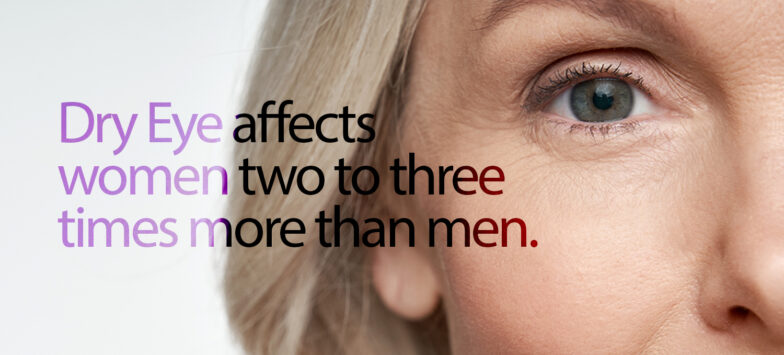
More women than men take this “prize”: Dry Eye!
For Mother’s Day and every day, women beat out men in being more likely to develop the ophthalmic condition known as Dry Eye Syndrome. In fact, dry eye is two to three times more likely to affect women than men, at any age. Sorry, ladies, we know this is not a race you want to win, but let’s look a bit closer at some of the whys of dry eye.
There is no single cause of dry eye, and the good news is it seldom leads to blindness. But when your eyes feel burning, scratchy or sensitive to light, it may be harder to read and drive, especially at night. Dry eyes can also increase the risk of eye infection, especially if you keep rubbing them.
Both men and women undergo hormone changes as they get older that can result in lower tear production. Dry eye tends to be especially common in women who have gone through menopause.
According to the American Academy of Ophthalmology, some other causes of dry eye include:
• Certain diseases, such as rheumatoid arthritis, Sjögren’s syndrome, thyroid disease, and lupus
• Blepharitis (when eyelids are swollen or red)
• Entropion (when eyelids turn in); ectropion (eyelids turn outward)
• Being in the smoke, wind, or a very dry climate
• Looking at a computer screen for a long time, reading, and other activities that reduce blinking
• Using contact lenses for a long time
• Having refractive eye surgery, such as LASIK
• Certain medicines can contribute to dry eye. Make sure to tell your Atlantic Eye ophthalmologist about all the medicines that you take.
This May, while we honor all women on Mother’s Day, be reassured that there are things we can do to help avoid or control Dry Eye Disease symptoms, such as:
• Try not to use a hairdryer, if possible.
• Stay away from very warm rooms. In the winter, add moisture to the air with a humidifier. Or put a pan of water near your heater or radiator.
• Protect your eyes from drying wind by wearing wrap-around glasses outside.
• Talk to your ophthalmologist about adding omega-3 fatty acids to your diet for dry eye relief.
• If advised, use artificial tear ointment or thick eye drops just before you go to bed.
• Ask your Atlantic Eye ophthalmologist for specific suggestions on the best day and night treatment products for your individual dry eye condition.
Don’t suffer from Dry Eye discomfort. Call Atlantic Eye today to schedule a visit at one of our four convenient N.J. locations, 732-222-7373. And if you prefer you can text us at the following numbers:
Text Eatontown (732) 889-7197
Text Holmdel (732) 889-7425
Text Little Silver (732) 889-7447
Text Wall Township (732) 889-7492
or email us directly at info@atlanticeye.com.
